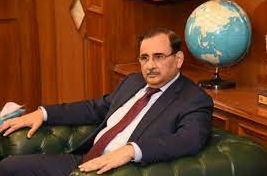Anjum Nisar says more hike in energy tariff to hit trade and industry hard

ISLAMABAD, JUL 7: /DNA/ – The Federation of Pakistan Chambers of Commerce and Industry’s Businessmen Panel (BMP) has asked the government to give priority to the economic recovery, emphasizing the necessity of joint efforts to tackle Pakistan’s economic difficulties, as economy is expected to grow by 1.9 percent in the current fiscal year.
Businessmen Panel (BMP) Chairman Mian Anjum Nisar warned that inflation would remain elevated at about 25 percent during the same period before easing a bit in the next financial year.
He said that the country has been facing significant economic challenges in recent years, grappling with high inflation, fiscal deficits and external debt pressures.
He expressed confidence in the country’s ability to overcome these challenges and highlighted the government should fulfill the commitment to eradicating poverty and unemployment.
The government should remain steadfast in its commitment to guide Pakistan through its current economic and political challenges, with a focus on unity, effective governance, and public welfare.
The country has had trouble raising enough money to cover its expenses. Due to the low tax-to-GDP ratio, borrowing and outside help are heavily relied upon to close the fiscal imbalance. In Pakistan, there is a recurring budget deficit because the government spends more than it takes in. The national debt burden has risen, as a result, needing substantial financial resources for debt repayment. Both internal and external debt in Pakistan has been constantly rising.
The budget is largely consumed by debt servicing; leaving little money for social welfare and development initiatives. Circular debt, which is the accumulation of unpaid invoices and pending payments among power generation firms, distribution companies, and the government, is a problem in Pakistan’s energy sector.
This problem has a significant negative impact on the power sector’s finances and hinders its ability to meet the rising energy demand.
Other troubling issues also exist, posing obstacles to our economy’s expansion. Pakistan is ranked 173rd internationally for tax payments. According to a World Bank analysis, Pakistani businesspeople pay 47 taxes yearly, compared to those of Hong Kong, the United Arab Emirates, Ireland, Malaysia, Sri Lanka, and India, which are the countries with whom Pakistan must compete.
A single business that conducts business in four different Pakistani provinces annually disburses five corporate income taxes, twelve employer-paid pension contributions, twelve Social Security payments, one property tax, one professional tax, one vehicle tax, one stamp duty payment, one fuel tax payment, and twelve payments of goods and sales tax. An exporter needs 75 hours to complete border compliance and document compliance. Additionally, Pakistan dropped 23 spots on the indicator for corporate loan availability.
The nation was ranked 105th this year as opposed to 82nd last year. There wasn’t much money left to fund the company’s expansion because of the government’s expanding budget financing requirements. Pakistan’s Human Development Index is 0.544, placing it 161st out of 192 nations.
The HDI of Pakistan is among the lowest in Asia, right below Yemen and Afghanistan. The country dropped one spot, moving to positions 142 and 170 on the indices for registering businesses and properties, respectively.
There are 12 different treatments, and it takes roughly 18 days to finish them all. Similarly to that, it took many days to register a property. The nation climbed nine spots in the rating for handling building permits, landing at position 141. It takes an investor 252 days to complete 15 different types of procedures to obtain a building permit.
The BMP chairman said that the government will have its work sharply cut out as far as the economic challenges are concerned. Coming at the back of fast-unfolding climate change crisis and recent COVID pandemic that pushed millions into poverty with little fiscal capacity of government to provide anywhere near close to what was needed in stimulus spending.
Then there is acute debt distress, and seriously high inflation at the back of global aggregate supply shock, and accentuated by a world of rising conflicts, mainly in Ukraine, and the Middle East.
Last year, the country secured a $3 billion short-term loan from the International Monetary Fund (IMF) in a bid to stabilize its economy, with the final tranche anticipated for release in the coming days. Amid the ongoing economic difficulties, the Pakistani government is seeking a more extended bailout program from the IMF, though the specifics of the arrangement are still being negotiated.
The ADB report suggested Pakistan could find itself on a better footing to deal with the financial challenges if it continued to implement structural economic reforms diligently.
Growth is projected to remain subdued in FY2024‚ and pick up in FY2025, provided economic reforms take effect, it said. Real GDP is projected to grow by 1.9 percent in FY2024‚ driven by a rebound in private sector investment linked to progress on reform measures and transition to a new and more stable government.
Related News

Uzbekistan offers to sell 29 textile units to Pakistani investors
ISLAMABAD, JAN 21 /DNA/ – Uzbekistan has expressed keen interest in selling its 29 textileRead More

RCCI hosts meeting with U.S. agricultural delegation to explore trade opportunities
RAWALPINDI, JAN 21 /DNA/ – A high-level meeting with a visiting U.S. agricultural delegation was heldRead More


Comments are Closed